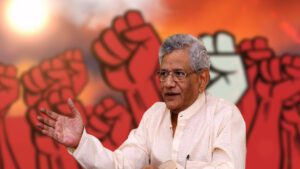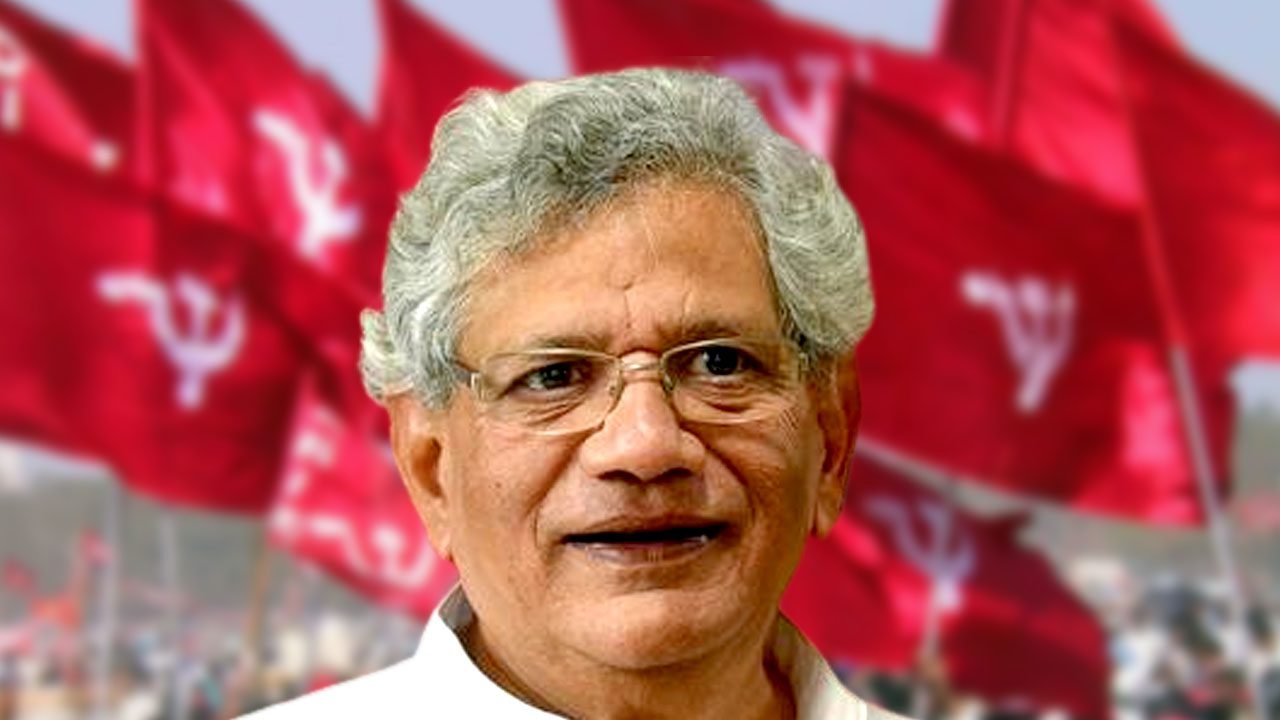Sitaram Yechury: A wide range of philosophies have historically shaped India’s political landscape. The steadfast leader of the Communist Party of India (Marxist), Sitaram Yechury, has had a significant impact on the formation of this ideological diversity (CPI-M). Yechury is widely recognized for his rigorous academic approach, incisive oratory abilities, and steadfast dedication to communist principles. His influence in Indian politics is immense. He has played a significant role in directing the CPI(M)’s course in the face of the nation’s continuously changing political landscape in his capacity as general secretary. We will examine Sitaram Yechury’s early years, political career, and important contributions to the left movement in India in an in-depth examination of his biography. We will also consider his more expansive outlook for the future of Indian politics.
Sitaram Yechury: Early Years and Educational Experience
Contents
On August 12, 1952, Sitaram Yechury was born in Madras, then known as Chennai, into a Telugu Brahmin family. His mother, Kalpakam Yechury, was a homemaker, while his father, Sarveswara Somayajulu, was an engineer. Yechury was raised mostly in Hyderabad during his early years, despite the fact that he was born in the southern region of India. His early life was marked by a strong sense of intellectual curiosity, fostered by his upbringing in an educated, middle-class household.
Sitaram Yechury attended All Saints High School in Hyderabad before embarking on his academic career. Well-known for his academic prowess, he relocated to Delhi to attend Delhi University’s St. Stephen’s College and graduated with a degree in economics. His formative years as a student had a profound impact on both his political and intellectual growth. Later on, he attended Jawaharlal Nehru University (JNU) to obtain a Master’s in Economics; this institution would come to represent his political awakening.

The Tipping Point: Student Politics at Jawaharlal Nehru University (JNU) In the 1970s, JNU served as a testing ground for political activism and ideas in India. It was more than just another university. Sitaram Yechury attended JNU at one of the most tumultuous times in Indian history—the Emergency of 1975-77, when civil liberties were suspended, and political dissent was curtailed by then-Prime Minister Indira Gandhi.
Sitaram Yechury was a major player in JNU student politics and was elected Student Union President in 1975. He was praised for his bravery and dedication to democratic ideals during the Emergency, when political activists were being imprisoned. He was taken into custody during the Emergency and imprisoned for a number of months. During this time in his life, he became more determined to oppose authoritarianism and solidified his political socialist ideology.
As CPI(M) Rises, Cadre Transitions to Leadership
In 1975, Yechury formally joined the Communist Party of India (Marxist) upon his graduation. He ascended through the party’s ranks during the following few decades, beginning his career as a member of the CPI(M) student wing, the Students’ Federation of India (SFI). His aptitude for leadership was promptly acknowledged, and he was named General Secretary of the SFI.
Sitaram Yechury rose to prominence in the CPI(M) by the late 1980s, and in 1984 he was admitted to the party’s Central Committee. As he progressed, he was elected to the Politburo, the CPI(M)’s top decision-making body, in 1992. Yechury was seen by the party, which had its roots mostly in working-class movements, as an intellectual who could successfully blend philosophy and practical politics. His deep knowledge of world and national politics made him a priceless member of the party.
Sitaram Yechury succeeded Prakash Karat as General Secretary of the CPI(M) in April 2015. His election occurred during a period of marked political downturn for India’s communist parties, particularly following the defeat of the Left Front government in West Bengal, a state where the CPI(M) had ruled for over three decades. Sitaram Yechury leadership brought with it hopes of revival and reinvention for the party.
Political Viewpoints and Ideologies
Sitaram Yechury is a devoted Marxist who has dedicated his political career to upholding the fundamentals of socialism. His political philosophy is based on the ideas that the state should be heavily involved in resource redistribution to maintain social fairness and that capitalism by its very nature creates inequality. In addition to reducing wealth disparity, he supports universal access to healthcare and education, land reforms, and the protection of workers’ rights.
Yechury has also acknowledged that Marxist theory needs to be modified to fit the unique circumstances of India. He has said that the Indian left needs to become more inclusive by addressing the issues of the middle class, farmers, disadvantaged groups, and working class as well. What sets Yechury’s leadership style apart from those of his predecessors is this practical approach.
Yechury argues that socialism can only be accomplished within a democratic system. In contrast to many other Marxist leaders across the world, Yechury has continuously advocated that the best way to bring about socialist change in India is to operate within the confines of the country’s democratic institutions. His political career has been distinguished by this dedication to democracy.
Career in Parliament and Its Contributions
The impact of Sitaram Yechury extends beyond party politics. Not insignificant contributions have either marked his parliamentary career or his tenure. In 2005, he was elected to represent the state of West Bengal in the Rajya Sabha, the upper house of the Indian Parliament. He made a name for himself as one of the most intelligent and well-spoken voices in Indian politics during his time in the Rajya Sabha, frequently taking part in discussions on important topics like social justice, economic reforms, and foreign policy.
His position on the 2008 Indo-US nuclear accord was one of his major contributions. Sitaram Yechury was an outspoken opponent of the agreement, claiming that it undermined India’s strategic autonomy and sovereignty, matching the stance of the CPI(M). Eventually, the CPI(M) stopped endorsing the Congress-led UPA government over the issue, a move that underscored Yechury’s influence in shaping the party’s foreign policy stance.
In addition, Sitaram Yechury has been a steadfast supporter of secularism, continuously opposing laws and initiatives that aim to split Indian society along religious lines. His remarks at public gatherings and in Parliament frequently stress the importance of preserving India’s varied culture. He has voiced concerns about the right-wing government’s potential to erode democratic principles and has criticized the emergence of majoritarian politics in India.
Obstacles and Remarks
Sitaram Yechury has faced difficulties as a leader, despite the fact that his contributions to Indian politics are well acknowledged. The downfall of the left movement in India has been one of his biggest obstacles. Over the past 20 years, the CPI(M) and other Marxist parties have suffered a continuous decline in their support base, especially in West Bengal, which used to be a stronghold for the party.



Critics of Yechury contend that the left has not adjusted to the shifting socio-political landscape in India. The CPI(M) is still dedicated to its historic base of support among laborers and peasants, but it has found it difficult to win over younger people, who are more inclined toward right- or centrist-wing beliefs. Additionally, the party’s inflexible adherence to ideological purity has sometimes limited its ability to form alliances with other political parties, a strategy that could have helped it remain politically relevant.
Yechury has put up great effort to resurrect the left in India in spite of these attacks. The CPI(M) has worked hard under his direction to build larger coalitions with local parties and groups that support secularism and social justice. Additionally, Sitaram Yechury has made a strong case for the party’s internal reforms, which are necessary to make it more democratic and receptive to the concerns of common people.
History and Significance
Being a link between the old and new left would probably defineSitaram Yechury legacy in Indian politics. As the political landscape changes constantly, he is a leader who has stayed faithful to his ideological foundation while still understanding that change and adaptation are necessary. His theoretical and practical contributions to political theory have had a lasting impression on Indian politics.
Sitaram Yechury consistent dedication to democratic socialism serves as a reminder of the lasting significance of socialist ideas in a time when right-wing populism is on the rise throughout the world. Even if the CPI(M)’s future is still unknown, Sitaram Yechury’s leadership will surely continue to influence Indian politics for some time to come.
In summary
Sitaram Yechury One of the most influential people in the history of the left in India is Sitaram Yechury. He is well-liked not just in his party but also in politics generally because of his political savvy, rigorous mind, and strong devotion to socialism. As the CPI(M) moves through
